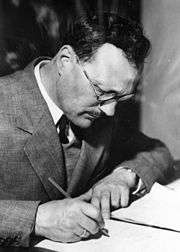Franz Ollendorff
| Franz Ollendorff | |
|---|---|
 | |
| Born |
15 May 1900 Berlin, Germany |
| Nationality | Israeli |
| Fields | Physics |
| Notable awards |
Israel Prize (1954) IEEE James H. Mulligan, Jr. Education Medal (1971) |
Franz Heinrich Ollendorff (Hebrew פרנץ אולנדורף or חיים אולנדורף; born 15 May 1900; died 9 December 1981) was an Israeli physicist.
Biography
Franz Heinrich (Haim) Ollendorf was born in Berlin. In 1924, he joined the Siemens research department in Berlin, working under Reinhold Ruedenberg. From 1928 he taught in the engineering faculty of the Berlin Technische Hochschule. Despite protest from his supervisor and university rector Ernst Orlich, the Nazis forced Ollendorff to resign in 1933. Soon after the dismissal, Ollendorff joined the teaching staff of the Jewish public school in Berlin, moving to Jerusalem when the school and staff transferred there in 1934.
Ollendorff returned to Germany in the following year to organize the transfer of Jewish children to Mandatory Palestine within the framework of the newly established Youth Aliyah. In 1937 he was finally expelled by the Gestapo. In 1939, he joined the staff of the Haifa Technion and became a professor in the faculty of electrical engineering. He specialized in biomedical electronics and physics.
He was a member of the Israel Academy of Sciences and was awarded the Israel Prize for his research in magnetic fields (1954). He was elected a fellow of the American Institute of Electrical Engineers in 1963 and served as the Institute's vice president.
His interest in the education of teenagers made him a keen supporter of the Technion's vocational high school.
Ollendorff wrote books and papers on electronics, physics, mathematics, acoustics, medical electronics, technical education, and other specialized fields. His publications include Die Grundlagen der Hochfrequenztechnik (1926); Erdstroeme (1928); Die Welt der Vektoren (1950); and Innere Elektronik (1955).
Awards
In 1954, Ollendorff was awarded the Israel Prize, in exact sciences.[1]
A plaque commemorating Orlich's courage hangs in the Physics department at the Technion.[2]
See also
References
- ↑ "Israel Prize recipients in 1954 (in Hebrew)". Israel Prize Official Site. Archived from the original on 11 February 2010.
- ↑ "Ernst Orlich plaque in the Lidow Physics building at the Technion in Haifa, Israel". imgur Photo.
| ||||||||||||||
|